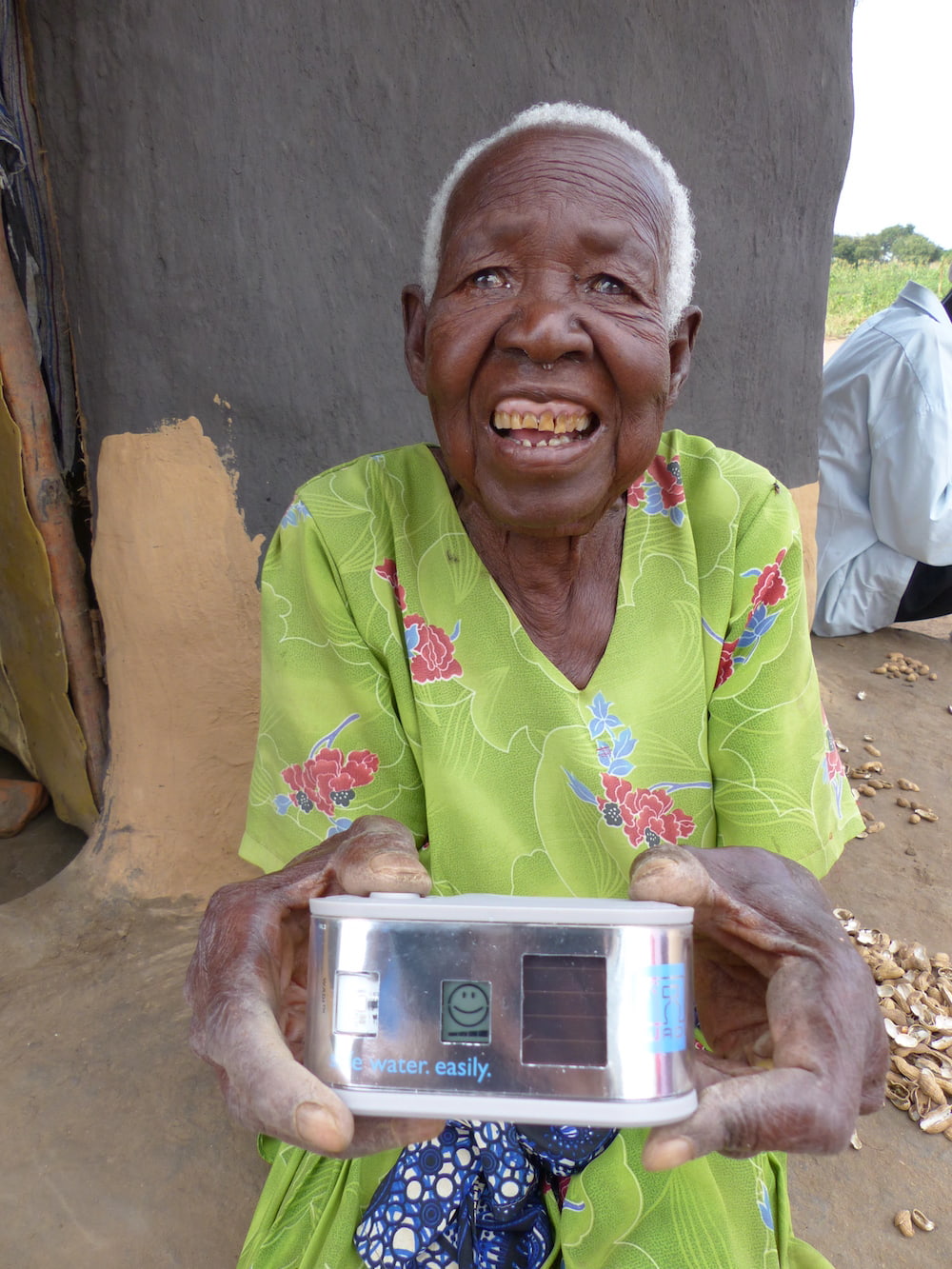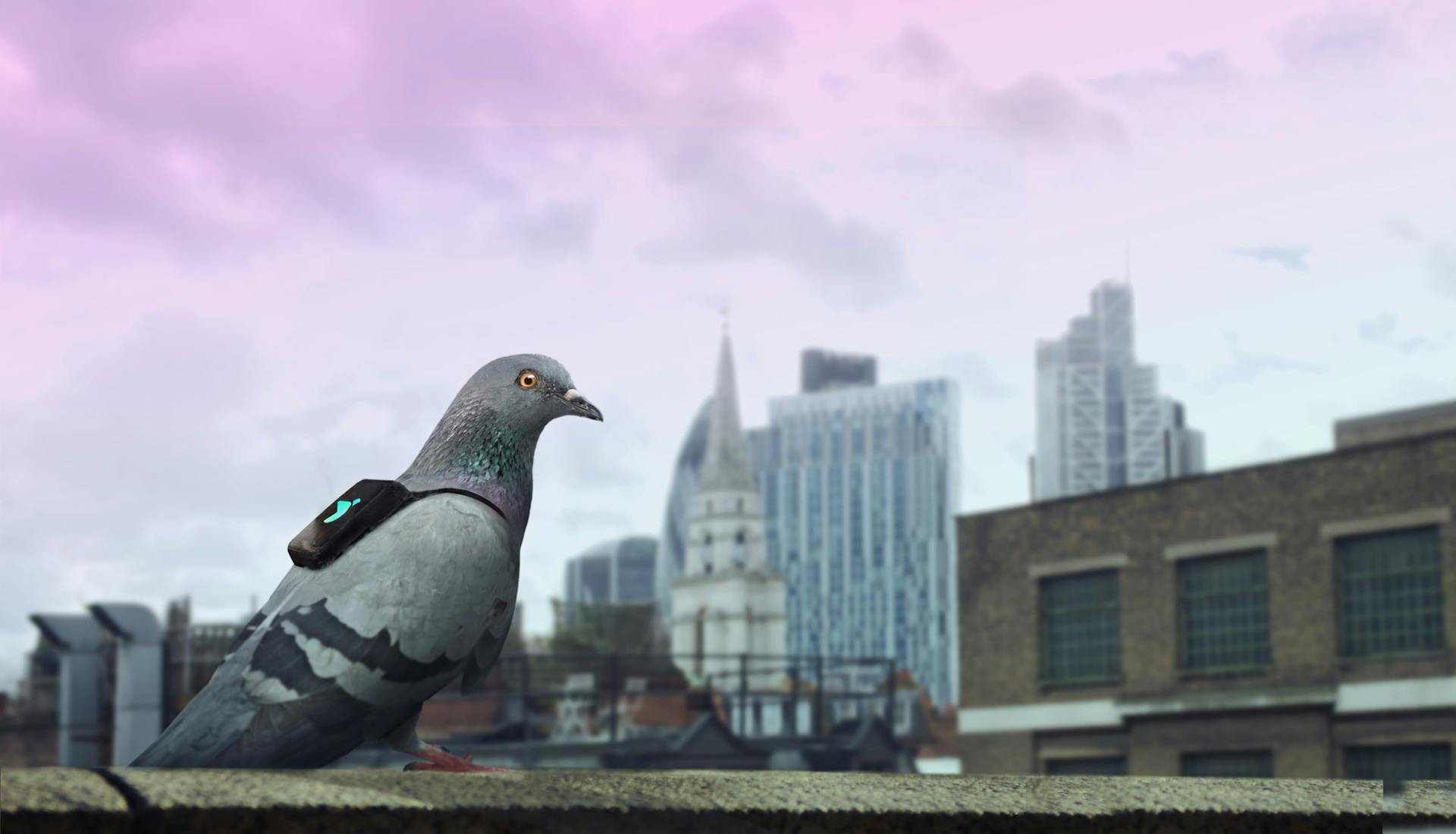
The innovators creating a kinder, more sustainable future
In the 18th century, we had the industrial revolution. The 1950s began the digital revolution, as we moved away from analogue and mechanics. And now, we’re at the dawn of a new technological age.
In the past 20 years, we’ve seen our everyday lives transformed with new developments: we said goodbye to dial-up internet in 1997 when wifi was first available to the public; the couldn’t-live-without-it iPhone arrived in 2007; and in the past few years we’ve seen an overwhelming rise in the popularity of voice-controlled products to make our daily lives even easier. We have driverless cars in development, and the illusive subatomic “God Particle” has been found.
Blink twice and the next life-altering invention is already off the shelves and in the bargain bin. The speed we’re moving at can feel scary – it is scary, but it can also be wonderful. Many people see advancements in technology as a way to not just make life easier for people in general, but to make a real difference in the world.
Here, Happiful speaks to some of the inspiring people and organisations harnessing the power of tech to create a happier, more sustainable future.
Air pollution levels in UK cities have been hitting dangerous levels. The Royal College of Physicians and Royal College of Paediatrics and Child Health have estimated that around 40,000 people die prematurely as a result of air pollution ever year. While the government struggles to make commitments to pollution control, Plume Labs is empowering citizens with tech to harvest data and fight pollution on a scale not seen before.
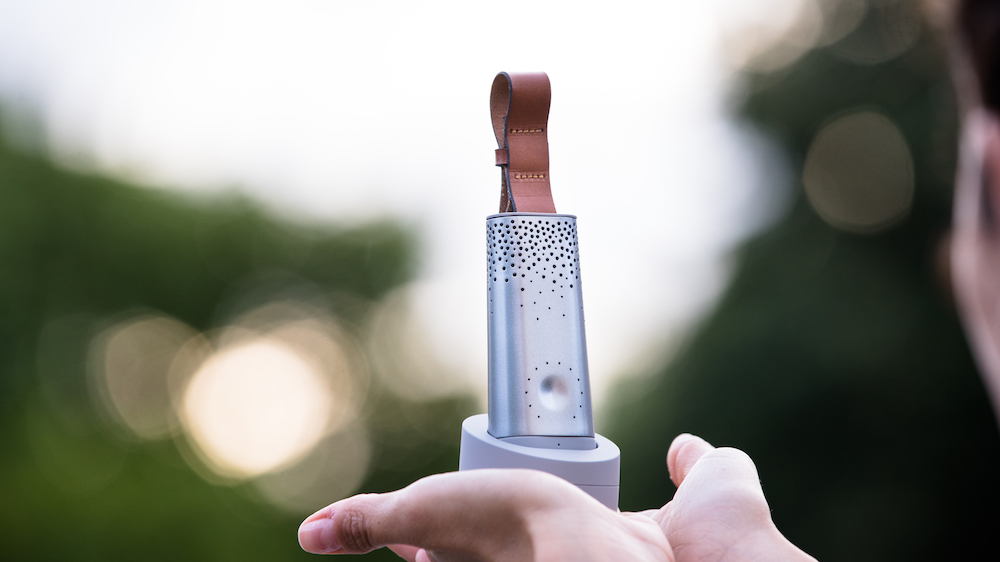
Flow
Founded in 2014 with the goal to equip people with the tools to avoid air pollution, Plume Labs made headlines with their unusual first steps in tracking pollution across cities: a fleet of pigeons wearing tiny backpacks that record pollution levels.
In March 2016, the pigeons were let loose across London, collecting data on the varying air pollution levels in the city. Not only did the so-called Pigeon Patrol make national headlines and bring light to a serious but often overlooked problem, they also provided the developers back in Plume Labs with the data they needed to take the next step in their mission to help us breathe clean air.
“We’ve gone from pigeons to people!” says Romain Lacombe, CEO of Plume Labs.
Summer 2018 brings the release of Flow, a piece of wearable tech that tracks the pollution level in your area, with the aim of helping you find fresher, cleaner air. A small group of Beta testers who wanted to take their health into their own hands, successfully tracked 1,300 miles of walkways in London, covering 20% of the inner-city area. The detailed results of pollution tracking was unprecedented, and is evidence of just what a small group of people, empowered by technology, can achieve.
“Pollution is personal,” says Romain.“With personal sensors, actionable advice, and crowdsourced data, we can arm people and communities with the tools to tackle the dramatic urban air pollution crisis – and help us find clean air, together.”
Read more on uk.flow.plumelabs.com
In the UK, around one in 1,000 people are amputees, but the NHS can only offer basic models of prosthetics. More advanced, private options can cost up to £65,000. Open Bionics want to bring affordable, advanced prosthetics to the masses, and they’re already making headlines with their superhero-themed bionic hands for children.
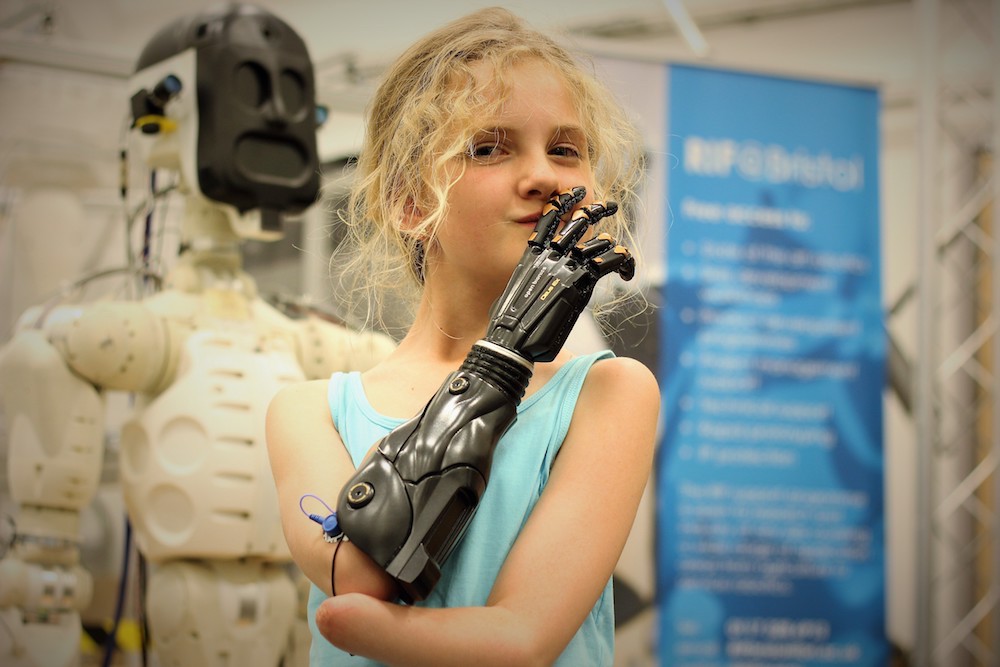
11-year-old-Tilly Lockey
“We’re turning children with limb differences into superheroes by developing bionic arms based on their favourite films and video games,” says Joel Gibbard, CEO of Open Bionics. “These are affordable, highly functional, multi-grip myoelectric prosthetics that kids can get really excited about.”
In contrast to the “hook-type” and “basic gripper” prosthetics offered by the NHS, Open Bionics want to create limbs amputees will be proud to wear. “They’re not just getting medical devices,” says Joel, “they’re getting cutting-edge bionic hands inspired by their favourite characters, such as the Iron Man hand hot out of Tony Stark’s workshop, the Star Wars lightsaber hand, and the Snowflake hand, inspired by Queen Elsa from Disney’s Frozen.”
Open Bionics is hoping to revolutionise prosthetic design. 3D scanning allows them to build the socket for the hand in just 24 hours, fitting amputees with a precision not yet seen in prosthetics. Sensors attach to the skin to detect muscle movements, which control the hand and fingers. The bionic arms will be available later in 2018, but there’s an ongoing NHS trial with 10 youngsters giving feedback on the arms.
11-year-old Tilly is on the trial. After contracting a deadly form of meningitis when she was just 15 months old, Tilly underwent an operation to have both her hands amputated. “Tilly loves heroes and superpowers, so in 2016 we worked with her to design a Deus Ex bionic arm,” says Joel.
“Instead of people feeling sorry for you because you don’t have a hand,” said Tilly, “they’re like: ‘Oh my gosh, that’s a cool hand!’”
“Our incredible engineering team are always innovating,” says Joel. “By 2037, we’re aiming to develop a bionic hand with human-level function!”
Find out more at: openbionics.com
Imagine powering a city by harnessing the footsteps of people walking its streets. For Pavegen, this will soon become a reality.
Founded in 2009, Pavegen created tiles that convert the energy from footfall into clean energy. As you step across the tiles, your weight causes electromagnetic generators to vertically displace, resulting in a motion that generates off-grid electricity.
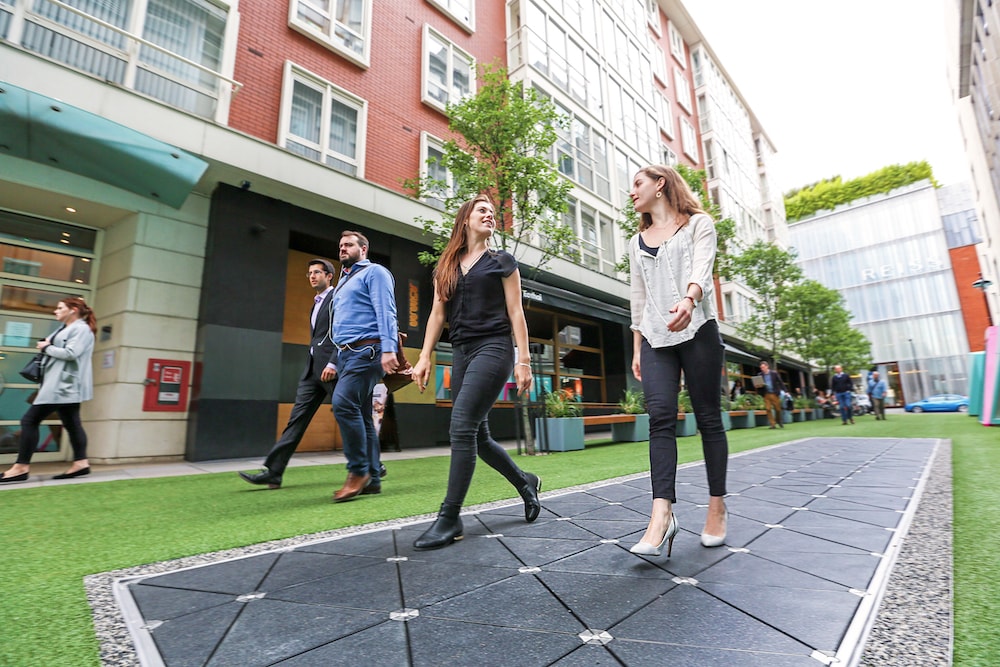
Pavegen
“With more than 55% of people living in cities and the pressures of climate change, it’s essential we replace carbon-intensive transport systems with more sustainable options,” says Laurence Kemball-Cook, founder and CEO of Pavegen. According to Pavegen, a single footstep has the kinetic power to generate an LED light bulb for approximately 20 seconds.
“We’re part of a fast-growing movement that’s helping cities become places where walking and cycling take priority over cars,” says Lawrence. “We’re creating a positive and lasting impact for our natural resources, but also for the health and wellbeing of our communities.”
Find out more at: pavegen.com
Already a major topic of conversation in 2018, Skipping Rocks Lab has come up with an innovative solution to our problem with plastic. Every single piece of plastic ever produced still exists. It’s a scary thought, particularly when 36 billion plastic bottles are used each year, and that number is growing at 4% per year.
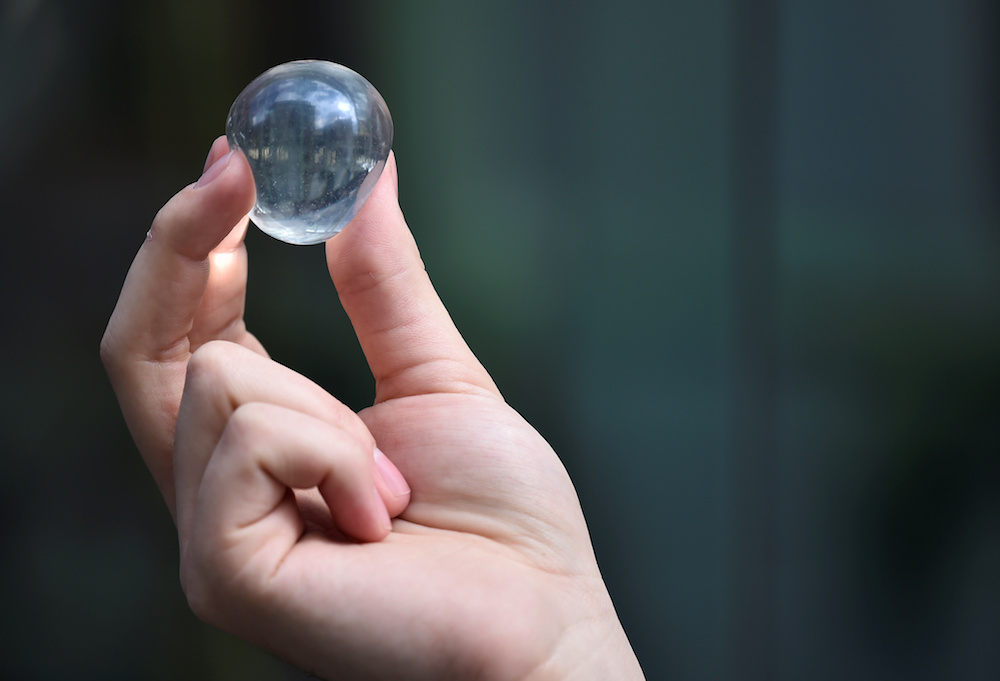
Ooho
Skipping Rocks Lab is a sustainable packaging startup based in London. “Our mission is to provide sustainable packaging technologies to companies as an alternative to plastic packaging,” it says. “We’re pioneering the use of natural materials extracted from seaweed, to create materials with low environmental impact.”
For its first product, Ooho, it took inspiration from the thin membrane of egg yolks. The bubble that holds the water is entirely edible, meaning there’s zero waste. The lab says: “They’re 100% made of seaweed and plants, so they biodegrade within weeks.”
But they see no need to stop at plain water. In summer 2018, they will be launching their own brand of flavoured waters coming in three sizes, and in various flavours including minty fresh, elderflower, and blackcurrant. Going forward, they intend to partner with established brands to provide edible Ooho packaging.
Find out more and watch demos at: skippingrockslab.com
Helioz
WADI is a life-saving device created by Helioz. Powered by the sun, it exposes water to UV radiation that disinfects it. Just fill a bottle with water, place it and the WADI in the sun for a couple of hours, and watch the face on the display go from sad to happy. Once the face is smiling, the water is clean and safe to drink!
Every day, 2,000 children under the age of five die because of waterborne diarrheal diseases. According to UNICEF, 99% of these deaths occur in developing countries.
Low cost, sustainable, and endorsed by WHO and UNICEF, WADI offers the opportunity to eradicate waterborne diseases and improve the living conditions of people living in some of the most deprived communities in the world.
Read more at: helioz.org
When we’re introduced to lifelike robots, or the idea of a driverless car tearing down the motorway, the future can look like a scary place. But thanks to these innovative companies, a future with their tech in our world looks like a happy, sustainable place.
Working across disciplines, cultures, and physical borders, pushing the boundaries of human creativity and invention, this small selection of tech companies striving for a better world is evidence that a kinder, cleaner and more sustainable future could be within reach.
